日语专业四级真题2004
大学日语四级考试真题哦
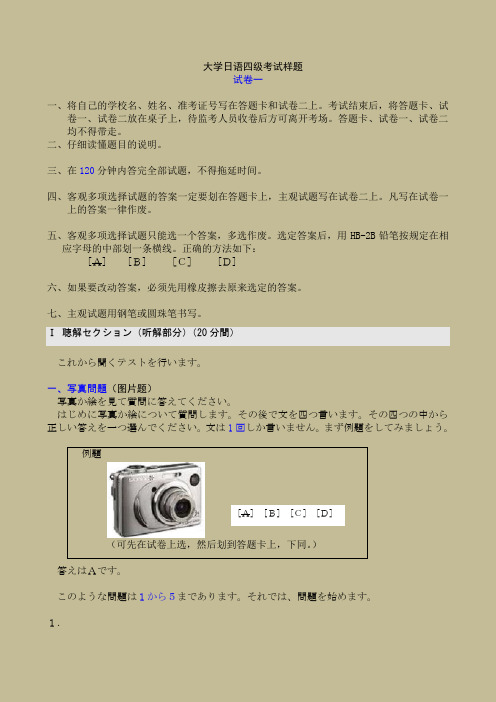
大学日语四级考试样题试卷一一、将自己的学校名、姓名、准考证号写在答题卡和试卷二上。
考试结束后,将答题卡、试卷一、试卷二放在桌子上,待监考人员收卷后方可离开考场。
答题卡、试卷一、试卷二均不得带走。
二、仔细读懂题目的说明。
三、在120分钟内答完全部试题,不得拖延时间。
四、客观多项选择试题的答案一定要划在答题卡上,主观试题写在试卷二上。
凡写在试卷一上的答案一律作废。
五、客观多项选择试题只能选一个答案,多选作废。
选定答案后,用HB-2B铅笔按规定在相应字母的中部划一条横线。
正确的方法如下:[A][B][C][D]六、如果要改动答案,必须先用橡皮擦去原来选定的答案。
七、主观试题用钢笔或圆珠笔书写。
Ⅰ聴解セクション(听解部分)(20分間)これから聞くテストを行います。
一、写真問題(图片题)写真か絵を見て質問に答えてください。
はじめに写真か絵について質問します。
その後で文を四つ言います。
その四つの中から正しい答えを一つ選んでください。
文は1回しか言いません。
まず例題をしてみましょう。
例題[A] [B] [C] [D](可先在试卷上选,然后划到答题卡上,下同。
)答えはAです。
このような問題は1から5まであります。
それでは、問題を始めます。
1.2.3.4.5.[A] [B] [C] [D] [A] [B] [C] [D] [A] [B] [C] [D] [A] [B] [C] [D][A] [B] [C] [D]二、応答問題(应答题)始めに一人が短い文を一つ言う。
その後でもう一人がそれに答える。
正しい答えを[A][B][C][D]から、一つ選んでください。
文は一回しか言いない。
まず例題をしてみよう。
例題[A] [B] [C] [D]答えはAです。
このような問題は6から10まであります。
それでは、問題を始めます。
6.[A] [B] [C] [D]7.[A] [B] [C] [D]8.[A] [B] [C] [D]9.[A] [B] [C] [D]10.[A] [B] [C] [D]三、会話問題(对话题)二人の会話を聞いて、質問に答えてください。
2004专四真题与答案详解TEM4

2004专四真题与答案详解TEM4TEST FOR ENGLISH MAJORSTEST FOR ENGLISH MAJORS (2005)-GRADEFOUR-TIME LIMIT: 130 MINPART I DICTATION [15 MIN ]Listen to the following passage. Altogether the passage will be read to you four times. During the first reading, which will be read at normal speed, listen and try to understand the meaning. For the second and third readings, the passage will be read sentence by sentence, or phrase by phrase, with intervals of 15 seconds. The last reading will be read at normal speed again and during thistime you should check your work. You will then be given 2 minutes to check through your work once more. Please write the whole passage on ANSWER SHEET ONE.PART II LISTENING COMPREHENSION [15 MIN ]In Sections A, B and C you will hear everything once only. Listen carefully and then answer the questions that follow. Mark the correct answer to each question on your answer sheet.SECTION A CONVERSATIONSIn this section you will hear several conversations. Listen to the conversations carefully and then answer the questions that follow.Questions 1 to 3 are based on the following conversation. At the end of the conversation, you will be given 15 seconds to answer the questions. Now listen to the conversation.1.According to the conversation, Mr Johnson is NOT very strong inA. history.B. geography.C. mathematics.D. art.2.Mr Johnson thinks that _______ can help him a lot in the job.A. logicB. writingC. historyD. mathematics3.Mr Johnson would like to work as a(n)A. adviser.B. computer programmer.C. product designer.D. school teacher.Questions 4 to 7 are based on the following conversation. At the end of the conversation, you will be given 20 seconds to answer the questions. Now listen to the conversation.4.What is the main purpose of the research?A.To make preparations for a new publication.C.To know how housework is shared.5.What does the man do on Fridays?A.He goes to exercise classes.C. He goes to the cinema.6.On which day does the couple always go out?A. Friday.B. Saturday.7.Which personal detail does the man give?A. Surname.B. First name.B. To learn how couples spend their weekends.D. To investigate what people do at the weekend.B. He goes sailing.D. He stays at home.C. Sunday.D. Any weekday.C. Address.D. Age.Questions 8 to 10 are based on the following conversation. At the end of the conversation, you willbe given 15 seconds to answer the questions. Now listen to the conversation.8.Parcel Express needs the following details about the sender EXCEPTA. name.B. address.C. receipt.D. phone number.9.Parcels must be left open mainly forA. customs‘ check.B. security check.C. convenience‘Ds. sakethecompany.‘ s sake.10. The woman‘ s last inquiry is mainly concerned withA. the time needed for sending the parcel.B. the flight time to New York.C. the parcel destination.D. parcel collection.SECTION B PASSAGESIn this section, you will hear several passages. Listen to the passages carefully and then answer the questions that follow.Questions 11 to 13 are based on the following passage. At the end of the passage, you will be given15 seconds to answer the questions. Now listen to the passage.11.Where is the train to Nanjing now standing?A. At Platform 7.B. At Platform 8.C. At Platform 9.D. At Platform 13.12.Which train will now leave at 11:35?A. The train to Jinnan.B. The train to Zhengzhou.C. The train to Tianjin.D. The train to Hangzhou.13.Which train has now been cancelled?A. The train to Jinnan.B. The train to Zhengzhou.C. The train to Tianjin.D. The train to Hangzhou.Questions 14 to 17 are based on the following passage. At the end of the passage, you will be given20 seconds to answer the questions. Now listen to the passage.14. The museum was built in memory of thoseA. who died in wars.B. who worked to help victims.C. who lost their families in disasters.D. who fought in wars.15. Henry Durant put forward the idea because heA. had once fought in a war in Italy.B. had been wounded in a war.C. had assisted in treating the wounded.D. had seen the casualties and cruelties of war.16. Which of the following statements about the symbols isINCORRECT?A. Both are used as the organization ficial symbols‘of.B. Both are used regardless of religious significance.C. The red cross was the organization‘ s original symbol.D. The red crescent was later adopted for use in certain regions.17. How should cheerleading be viewed according to the passage?A. It is just a lot of cheering.B. It mainly involves yelling.C. It mainly involves dancing.D. It is competitive in nature.Questions 18 to 20 are based on the following passage. At the end of the passage, you will be given 15 seconds to answer the questions. Now listen to the passage.18. How do the cheerleaders perform their jobs?A. They set fireworks for their team.B. They put on athletic shows.C. They run around the spectators.D. They yell for people to buy drinks.19. Why do the cheerleaders sometimes suffer physical injuries?A. Because they try dangerous acts to catch people‘ s attention.20.Which of the following statements is NOT true?A.The first cheerleaders was a man named John Campbell.B.Cheerleaders‘ contests are only held at the state level.C.Before 1930 there were no women cheerleaders.D.The first cheerleading occurred in 1898.Questions 21 to 22 are based on the following news. At theend of the news item, you will be given10 seconds to answer the questions. Now listen to the news.21. How many of the emigrants died after being thrown into the sea?A. 15 of them.B. 3 of them.C. 100 of them.D. Dozens of them.22. The illegal emigrants came fromA. Italy.B. Africa.C. the Mediterranean region.D. places unknown. Question 23 is based on the following news. At the end of the news item, you will be given 5 seconds to answer the question. Now listen to the news.23.What does the news item mainly report?A.China will send three people into space in a week.B.Three Chinese astronauts will spend a week in space.C.The Shenzhou VI will be launched next year.D.Shenzhou V circled the earth for two days.Questions 24 and 25 are based on the following news. At the end of the news item, you will be given 10 seconds to answer the questions. Now listen to the news.24. Which of the following had NOT been affected by the wildfires?A. Houses.B. Land.C. Skies.D. Cars.25. The fires were thought to have been startedA. purposefully.B. accidentally.C. on the Mexican border.D. in southern California.Questions 26 to 28 are based on the following news. At the end of the news item, you will be given15 seconds to answer the question. Now listen to the news.26. ________ ranks second among leading tourism nations.A. FranceB. The United StatesC. SpainD. Italy27. It is predicted that by 2020 China will receive _________ visitors.A. 77 millionB. 130 millionC. 36.8 millionD. 100 million28. According to a Xinhua report, last year saw a _________ per cent increase in the number of Chinese traveling abroad.A. 16.6B. 30C. 100D. 37Question 29 and 30 are based on the following news. At the end of the news item, you will be given10 seconds to answer the question. Now listen to the news.29.What would happen to the Argentine officers?A.They would be arrested by Spanish authorities.B.They would be tried in an Argentine court.C.They would be sent to Spain for trial.D.They would be tortured or murdered.30.What accusation would the Argentine officers face?A.Violation of human rights.B.Involvement in illegal actions.C.Planning anti-government activities.D.Being part of the military rule.PART III CLOZE [15 MIN. ]Decide which of the choices given below would best complete the passage if inserted in the corresponding blanks. Mark the best choice for each blank on your answer sheet.A person ‘ s home is as much a reflection of his personality as the clothes he wears, the food heeats and the friends with whom he spends his time. Depending on personality, most have in minda(n)― (31) ______ home‖ . But in general, and especially for th e student or new wage earners, there are practical (32) ________ of cash and location on achieving that idea.Cash (33) ________, in fact, often means that the only way of (34) _________ when you leave school is to stay at home for a while until things (35) _________ financially. There are obvious (36) ________of living at home— personal laundry is usually (37) _________ done along with the family wash; meals are provided and there will be a well-established circle of friends to (38) _________. And there is (39) _________ the responsibility for paying bills, rates, etc. On the other hand, (40)_________ depends on how a family gets on. Do your parents like your friends? Youmay love your family — (41) _________do you like them? Are you prepared to be (42) __________when your parents ask where you are going in the evening and what time you expect to be back? Ifyou find that you cannot manage a(n) (43) _________, and that you finally have the money to leave,how do you (44) _________ finding somewhere else to live?If you plan to stay in your home area, the possibilities are (45) _________well-known to you already. Friends and the local paper are always (46) _________. If you are going to work in a (47) _________ area, again there are the papers—and the accommodation agencies, (48) _________ these should be approached with (49)_________. Agencies are allowed to charge a fee, usually the (50) ________ of the first weekif you take accommodation they have found for you.31.A. ideal B. perfect C. imaginary D. satisfactory32.A. deficiencies B. weaknesses C. insufficiencies D. limitations33.A. cut B. shortage C. lack D. drain34.A. getting over B. getting in C. getting back D. getting along35.A. improve B. enhance C. develop D. proceed36.A. concerns B. issues C. advantages D. problems37.A. still B. always C. habitually D. consequently38.A. call in B. call over C. call upon D. call out39.A. always B. rarely C. little D. sometimes40.A. little B. enough C. many D. much41.A. and B. but C. still D. or42.A. tolerant B. hostile C. indifferent D. good-tempered43.A. agreement B. consensus C. compromise D. deal44.A. go about B. go over C. go in for D. go through45.A. seldom B. less C. probably D. certainly46.A. dependent B. a good source of informationC. of great valueD. reliable47.A. familiar B. cold C. humid D. new48.A. though B. while C. since D. as49.A. enthusiasm B. hesitation C. caution D. concern50.A. same B. equivalent C. equal D. similarityPART IV GRAMMAR & VOCABULARY[15 MIN ]There are thirty sentences in this section. Beneath each sentence there are four words or phrases marked A, B, C and D. Choose one word or phrase that best completes the sentence.Mark your answers on your answer sheet51.If you explained the situation to your solicitor, he ________ able to advise you much better thanI can.A. would beB. will have beenC. wasD. were52. _________, Mr. Wells is scarcely in sympathy with the working class.A. Although he is a socialistB. Even if he is a socialistC. Being a socialistD. Since he is a socialist53.His remarks were ________ annoy everybody at the meeting.A. so as toB. such as toC. such toD. as much as to54.James has just arrived, but I didn‘ t know he _________ until yesterday.A. will comeB. was comingC. had been comingD. came55._________ conscious of my moral obligations as a citizen.A. I was and always will beB. I have to be and always will beC. I had been and always will beD. I have been and always will be56.Because fuel supplies are finite and many people are wasteful, we will have to install _________solar heating device in our home.A. some type ofB. some types of aC. some type of aD. some types of57.I went there in 1984, and that was the only occasion whenI ________ the journey in exactlytwo days.A. must takeB. must have madeC. was able to makeD. could make58.I know he failed his last test, but really he‘ s _________ stupid.A. something butB. anything butC. nothing butD. not but59.Do you know Tim‘ s brother? He is _________ than Tim.A. much more sportsmanB. more of a sportsmanC. more of sportsmanD. more a sportsman60.That was not the first time he ________ us. I think it‘ s high time we ________ stro against him.A. betrayed ? takeB. had betrayed? tookC. has betrayed? tookD. has betrayed? take61.What ‘ s the chance of ________ a general election this year?A. there beingB. there to beC. there beD. there going to be62.The meeting was put off because we __________ a meeting without John.A. objected havingB. were objected to havingC. objected to haveD. objected to having63.________ you _______ further problems with your printer, contact your dealer for advice.A. If, hadB. Have, hadC. Should, haveD. In case, had64.He asked me to lend him some money, which I agreed to do, ________ that he paid me back the following week.A. on occasionB. on purposeC. on conditionD. only if65. Children who stay away from school do ________ for different reasons.A. themB. /C. itD. theirs66.–Why are you staring?–I ‘ve never seen ______tree before.A. kind ofB. that kind ofC. such kindD. such67.There are still many problem ahead of us, but by his time next year we can see light at the end ofthe _________.A. battleB. dayC. roadD. tunnel68.We realized that he was under great _________, so we took no notice of his bad temper.A. excitementB. stressC. crisisD. nervousness69.The director tried to get the actors to _________ to the next scene by hand signals.A. move onB. move offC. move outD. move along70.His ideas are invariably condemned as ________ by his colleagues.A. imaginativeB. ingeniousC. impracticalD. theoretical71.Thousands of people turned out into the streets to _________against the local authorities‘decision to build a highway across the field.A. contradictB. reformC. counterD. protest72.The majority of nurses are women, but in the higher ranks of the medical profession women arein a _________.A. minorityB. scarcityC. rarityD. minimum73.Professor Johnson‘ s retirement___from next January.A. carries into effectB. takes effectC. has effectD. puts into effect74.The president explained that the purpose of taxation was to ________ government spending.A. financeB. expandC. enlargeD. budget75.The heat in summer is no less _________ here in this mountain region.A. concentratedB. extensiveC. intenseD. intensive76.Taking photographs is strictly ________ here, as it may damage the precious cave paintings.A. forbiddenB. rejectedC. excludedD. denied77.Mr. Brown ‘ s condition looks very serious and it is doubtful if he will _________.A. pull backB. pull upC. pull throughD. pull out78.Since the early nineties, the trend in most businesses has been toward on-demand, always-available products and servicesthat suit the customer‘ s rather than the company ‘ s.A. benefitB. availabilityC. suitabilityD. convenience79.The priest made the ________ of the cross when he entered the church.A. markB. signalC. signD. gesture80.This spacious room is ________ furnished with just a few articles in it.A. lightlyB. sparselyC. hardlyD. rarelyPART V READING COMPREHENSION[25 MIN]In this section there are four passages followed by questions or unfinished statements, each withfour suggested answers marked A, B, C and D. Choose the one that you think is the best answer. Mark your answers on your answer sheet.TEXT AIt was 1961 and I was in the fifth grade. My marks in school were miserable and, the thing was,I didn ‘ knowt‘ enough to really care. My older brother and I lived with Mom in a dingy multi-familyhouse in Detroit. We watched TV every night. The background noise of our lives was gunfire andhorses hoofs from "Wagon Train" or "Cheyenne", and laughter from "I LoveLucy" or "MisterEd", After supper, we' d sprawl on Mom' s bed ..and stare for hours at the tube.But one day Mom changed our world forever. She turned off the TV. Our mother had only beenable to get through third grade. But she was much brighter and smarter than we boys knew at thetime. She had noticed something in the suburban houses she cleaned--books. So she came homeone day, snapped off the TV , sat us down and explained that her sons were going to make something of themselves. "You boys are going to read two books every week," she said. "And you‘ regoing to write me a r eport onwhat you read."We moaned and complained about how unfair it was. Besides, we didn ‘havet any books in thehouse other than Mom‘ s Bible. But she explained that we would go where the books were: "I' Ildrive you to the library."So pretty soon there were these two peevish boys sitting in her white 1959 Oldsmobile on theirway to Detroit Public Library.I wandered reluctantly among the children ‘books. I lovedanimals,so when I saw some books that seemed to be about animals, I started leafing through them.The first book I read clear through was Chip the Dam Builder . It was about beavers. Forthefirst time in my life I was lost in another world. No television program had ever taken me so faraway from my surroundings as did this verbal visit to a cold stream in a forest and these animalsbuilding a home.It didn‘ t dawn on me at the time, but the experience was quite different from watching TV. There were images forming in my mind instead of before my eyes. And I could return to them again and again with the flip of a page.Soon I began to look forward to visiting this hushed sanctuary from my other world. I movedfrom animals to plants, and then to rocks. Between the covers of all those books were wholeworlds, and I was free to go anywhere in them. Along the way a funny thing happened: I started toknow things. Teachers started to notice it too. I got to the point where I couldn hometo my books.Now my older brother is an engineer and I am chief of paediatric neurosurgery at John HopkinsChildren ‘ s Cei n treBaltimore. Sometimes I still can' t believe my life' s journey, from a failing andindifferent student in a Detroit public school to this position, which takes me all over the world toteach and perform critical surgery.But I know when the journey began--the day Mom snapped off the TV set and put us inher Oldsmobile for that drive to the library.81.We can learn from the beginning of the passage thatA.the author and his brother had done poorly in school.B.the author had been very concerned about his school work.C.the author had spent much time watching TV after school.D.the author had realized how important schooling was.82. Which of the following is NOT true about the author‘ s family?A. He came from a middle-class family.B. He came from a single-parent family.C. His mother worked as a cleaner.D. His mother had received little education.83. The mother was ________ to make her two sons switch to reading books.A. hesitantB. unpreparedC. reluctantD. determined84. How did the two boys feel about going to the library at first?A. They were afraid.B. They were reluctant.C. They were indifferent.D. They were eager to go.85.The author began to love books for the following reasons EXCEPT thatA.he began to see something in his mind.B.he could visualize what he read in his mind.C.he could go back to read the books again.D.he realized that books offered him new experience.Predicting the future is always risky. But it's probably safe to say that at least a few historianswill one day speak of the 20th century as America's ― Disneyera ‖Today,. it's certainlydifficult tothink of any other single thing that represents modern America as powerfully as the company thatcreated Mickey Mouse. Globally, brands like Coca-Cola and McDonalds may be more widely-known,but neither encapsulates 20th-century America in quite the same way as Disney.The reasons for Disney's success are varied and numerous, but ultimately the credit belongs to oneperson —the man who created the cartoon and built the company from nothing, Walt Disney. Ironically,he could not draw particularly well. But he was a genius inplenty of other respects. In business, hisgreatest skills were his insight and his management ability. After setting himself up in Hollywood, hesingle-handedly pioneered the concepts of branding and merchandising — somethinghis company still does brilliantly today.But what really distinguished Disney was his ability to identify with his audiences. Disney alwaysmade sure his films championed the ― little guy ‖ , and made him feel proud to be American. Th achieved by creating characters that reflected the hopes and fears of ordinary people. Somecelebrated American achievements —Disney's very first cartoon Plane Crazy, featuring a silent Mickey Mouse, was inspired by Charles Lindbergh's flight across the Atlantic. Others, like the There Little Pigs and Snow White and the Seven Dwarves, showed how, through hard work and helping one's fellow man or Americans could survive social and economic crises like the Great Depression. Disney's other great virtue was the fact that his company —unlike other big corporations —had a human face. His Hollywood studio —the public heard —operated just like a democracy, where everyone was on first name terms and had a say in how things should be run. He was also regarded as a great patriot because not only did his cartoons celebrateAmerica, but, during World War II, studios made training films for American soldiers.The reality, of course, was less idyllic. As the public would later learn, Disney's patriotism had an unpleasant side. After a strike by cartoonists in 1941, he became convinced that Hollywood had been infiltrated by Communists. He agreed towork for the FBI as a mole, identifying and spying on colleagues whom he suspected were subversives.But, apart from his affiliations with the FBI, Disney was more or less the genuine article. A new book, The Magic Kingdom; Walt Disney and the American Way of Life, by Steven Watts, confirms that he was very definitely on the side of ordinary Americans—in the 30s and 40s he voted for Franklin Roosevelt, believing he was a champion of the workers. Also, Disney was not an apologistfor the FBI, as some have suggested. In fact, he was always suspicious of large,bureaucratic organizations, as is evidenced in films like That Darned Cat, in which he portrayed FBI agents as bungling incompetents.By the time he died in 1966, Walt Disney was an icon like Thomas Edison and the Wright Brothers.To business people and filmmakers, he was a role model;to the public at large, he was ― Uncle Walt ‖—the man who had entertained them all their lives, the man who represented them all theirlives, the man who represented all that was good about America.86. Walt Disney is believed to possess the following abilities EXCEPTA. painting.B. creativityC. management.D. merchandising.87. According to the passage, what was the pleasant side of Disney‘ s patriotism?A. He sided with ordinary Americans in his films.B. He supported America‘ s war efforts in his own w ay.C. He had doubts about large, bureaucratic organizations.D. He voted for Franklin Roosevelt in the 30s and 40s.88. In the sixth paragraph the sentence― Disneywas more or less the genuine article means‖that ______.A. Disney was a creative and capable person.B. Disney once agreed to work for the FBI.C. Disney ran his company in a democratic way.D.Disney was sympathetic with ordinary people.89. The writer‘ s attitude toward Walt Disneycanbest be described asA. sympathetic.B. objective.C. critical.D. skeptical.TEXT CWhy do you listen to music? If you should put this question to a number of people, you mightreceive answers like these:― I like the beat of music‖ ,― I look for attractive tunefulness by the sound of choral singing‖ ,― I listen to music for many reasons but I could not begin to descri them to you clearly.‖ Answers to this question would be many and diverse, yet almost no one would reply, ― Music means nothing to me. ‖To most of us, music means something; it evokes someresponse. We obtain some satisfaction in listening to music.For many, the enjoyment of music does not remain at a standstill. We feel that we can get moresatisfaction from the musical experience. We want to make closer contact with music in order tolearn more of its nature; thus we can range more broadly and freely in the areas of musical style,form, and expression. This book explores ways of achieving these objectives. It deals, of course,with the techniques of music, but only in order to show how technique is directed toward expressiveaims in music and toward the listener‘ s musical experience. In this way, we may get an idea of th composer ‘intentions, for indeed, the composer uses every musical device for its power to communicate and for its contribution to the musical experience.Although everyone hears music differently,there is a common ground from which all musical experiences grow. That source is sound itself. Sound is the raw material of music. It makes up thebody and substance of all musical activity. It is the point of departure in the musical experience.The kinds of sound that can be used for musical purposes are amazingly varied. Throughout the cultures of the world, East and West, a virtually limitless array of sounds has been employed in theservice of musical expression. Listen to Oriental theatre music, then to an excerpt from a Wagnerwork; these two are worlds apart in their qualities of sound as well as in almost every other feature,yet each says something of importance to some listeners. Each can stir a listener and evoke a response in him. All music,whether it is the pulsation of primitive tribal drums or the complex coordination of voices and instruments in an opera, has this feature: it is based upon the power ofsound to stir our senses and feelings.Yet sound alone is not music. Something has to happen to the sound. It must move forward intime.Everything that takes place musically involves the movement of sound. If we hear a series of drumbeats, we receive an impression of movement from one stroke to the next. When sounds followeach other in a pattern of melody, we receive an impression of movement from one tone to the next.All music moves; and because it moves, it is associated with a fundamental truth of existence and experience. We are stirred by impressions of movement because our very lives are constantly in movement. Breathing, the action of the pulse, growth, decay, the change of day and night, as wellas the constant flow of physical action-these all testify to the fundamental role that movement playsin our lives. Music appeals to our desire and our need for movement.90.The author indicates at the beginning of the passage thatA. people listen to music for similar reasons.B. reasons for listening to music are varied.C. some people don ‘ t understand music at all.D.purposes for listening to music can be specified.91.We can infer from the second paragraph that the book from which this excerpt is taken ismainly meant forA. listeners.B. composers.C. musicians.D. directors.。
2002年日语专业四级真题
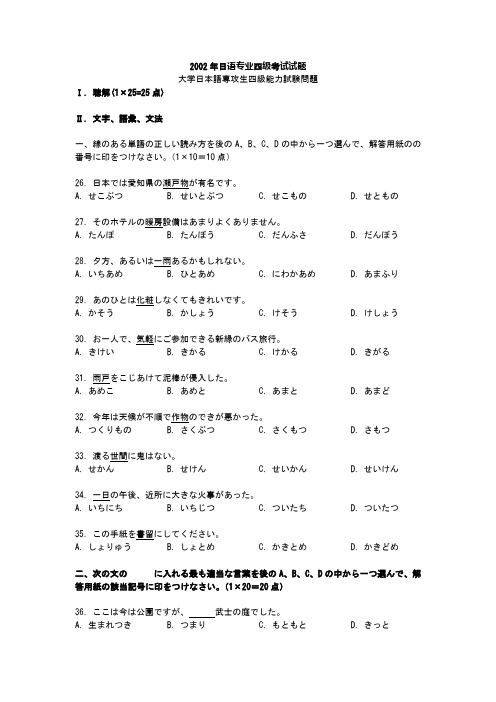
2002年日语专业四级考试试题大学日本語専攻生四級能力試験問題Ⅰ.聴解(1×25=25点)Ⅱ.文字、語彙、文法一、線のある単語の正しい読み方を後のA、B、C、Dの中から一つ選んで、解答用紙のの番号に印をつけなさい。
(1×10=10点)26.日本では愛知県の瀬戸物が有名です。
A.せこぶつB.せいとぶつC.せこものD.せともの27.そのホテルの暖房設備はあまりよくありません。
A.たんぽB.たんぼうC.だんふさD.だんぼう28.夕方、あるいは一雨あるかもしれない。
A.いちあめB.ひとあめC.にわかあめD.あまふり29.あのひとは化粧しなくてもきれいです。
A.かそうB.かしょうC.けそうD.けしょう30.お一人で、気軽にご参加できる新緑のバス旅行。
A.きけいB.きかるC.けかるD.きがる31.雨戸をこじあけて泥棒が侵入した。
A.あめこB.あめとC.あまとD.あまど32.今年は天候が不順で作物のできが悪かった。
A.つくりものB.さくぶつC.さくもつD.さもつ33.渡る世間に鬼はない。
A.せかんB.せけんC.せいかんD.せいけん34.一日の午後、近所に大きな火事があった。
A.いちにちB.いちじつC.ついたちD.ついたつ35.この手紙を書留にしてください。
A.しょりゅうB.しょとめC.かきとめD.かきどめ二、次の文のに入れる最も適当な言葉を後のA、B、C、Dの中から一つ選んで、解答用紙の該当記号に印をつけなさい。
(1×20=20点)36.ここは今は公園ですが、武士の庭でした。
A.生まれつきB.つまりC.もともとD.きっと37.両者の関係は冷えいた。
A.打ってB.立ってC.待ってD.切って38.よく来てくれました。
A.あれあれB.どれC.やっD.どれどれ39.各国の人と交流して、自分を。
A.捨てたいB.磨きたいC.流したいD.洗いたい40.今さら謝りに来てももう遅い。
A.のこのこB.よたよたC.とぼとぼD.しゃあしゃあ41.あの人は口が軽いから、秘密をもらし。
大学日语四级考试真题

大学日语四级考试样题试卷一一、将自己的学校名、姓名、准考证号写在答题卡和试卷二上。
考试结束后,将答题卡、试卷一、试卷二放在桌子上,待监考人员收卷后方可离开考场。
答题卡、试卷一、试卷二均不得带走。
二、仔细读懂题目的说明。
三、在120分钟内答完全部试题,不得拖延时间。
四、客观多项选择试题的答案一定要划在答题卡上,主观试题写在试卷二上。
凡写在试卷一上的答案一律作废。
五、客观多项选择试题只能选一个答案,多选作废。
选定答案后,用HB-2B铅笔按规定在相应字母的中部划一条横线。
正确的方法如下:[A][B][C][D]六、如果要改动答案,必须先用橡皮擦去原来选定的答案。
七、主观试题用钢笔或圆珠笔书写。
Ⅰ聴解セクション(听解部分)(20分間)これから聞くテストを行います。
一、写真問題(图片题)写真か絵を見て質問に答えてください。
はじめに写真か絵について質問します。
その後で文を四つ言います。
その四つの中から正しい答えを一つ選んでください。
文は1回しか言いません。
まず例題をしてみましょう。
例題[A] [B] [C] [D](可先在试卷上选,然后划到答题卡上,下同。
)答えはAです。
このような問題は1から5まであります。
それでは、問題を始めます。
1.2.3.4.5.[A] [B] [C] [D] [A] [B] [C] [D] [A] [B] [C] [D] [A] [B] [C] [D][A] [B] [C] [D]二、応答問題(应答题)始めに一人が短い文を一つ言う。
その後でもう一人がそれに答える。
正しい答えを[A][B][C][D]から、一つ選んでください。
文は一回しか言いない。
まず例題をしてみよう。
例題[A] [B] [C] [D]答えはAです。
このような問題は6から10まであります。
それでは、問題を始めます。
6.[A] [B] [C] [D]7.[A] [B] [C] [D]8.[A] [B] [C] [D]9.[A] [B] [C] [D]10.[A] [B] [C] [D]三、会話問題(对话题)二人の会話を聞いて、質問に答えてください。
日语专四真题
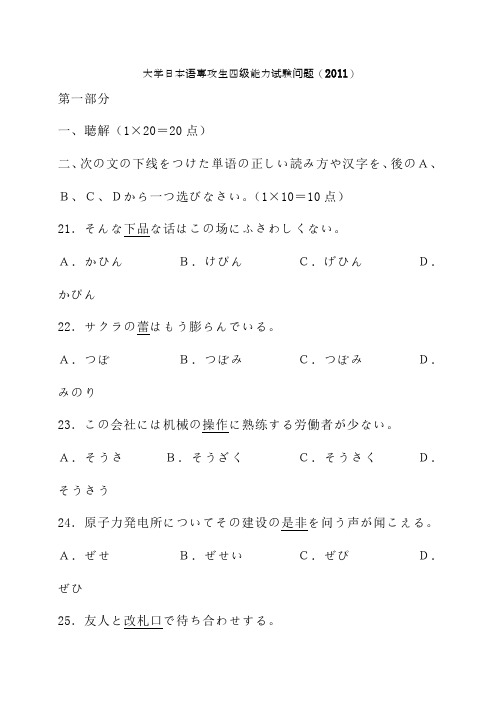
大学日本语専攻生四级能力试験问题(2011)第一部分一、聴解(1×20=20点)二、次の文の下线をつけた単语の正しい読み方や汉字を、後のA、B、C、Dから一つ选びなさい。
(1×10=10点)21.そんな下品な话はこの场にふさわしくない。
A.かひんB.けぴんC.げひんD.かぴん22.サクラの蕾はもう膨らんでいる。
A.つぼB.つぼみC.つぽみD.みのり23.この会社には机械の操作に熟练する労働者が少ない。
A.そうさB.そうざくC.そうさくD.そうさう24.原子力発电所についてその建设の是非を问う声が闻こえる。
A.ぜせB.ぜせいC.ぜぴD.ぜひ25.友人と改札口で待ち合わせする。
A.かいさつぐちB.かいさつくちC.かいさつごうD.かいさつこう26.このクラスの生徒たちはよく教室でさわぐんだよ。
A.閙B.唤C.扰D.騒27.このごろ、ふところに金が一銭もなく、困っている。
A.袖B.懐C.包D.财布28.あの子はしつけが悪い。
A.师付B.执化C.叱D.躾29.岛民の大半は空港建设賛成にかたむきつつある。
A.偏B.颇C.倾D.斜30.今度の事件は彼のしゅっせの妨げになるだろう。
A.出生B.终世C.出世D.终生三、次の文のに入れるのに最も适当な言叶を後のA、B、C、Dから一つ选びなさい。
(1×15=15点)31.どんな仕事でも一人前になるためには努力が必要だ。
A.かえざるB.さかえざるC.たえざるD.はえざる32.各々の持ち味をように工夫する必要があります。
A.まかすB.はなすC.ならすD.いかす33.こんな问题はもなく解决できる。
A.わけB.はずC.ものD.こと34.申告された件数はほんの一割程度にすぎない。
A.またB.まだC.もうD.そう35.今度の会见をに、両国関系は新たな局面を迎えた。
A.きっかけB.じつげんC.じっさいD.ひっかけ36.理由もなく急にそうなるさまを、日本语では「」という。
2004年考研日语真题假名注音版
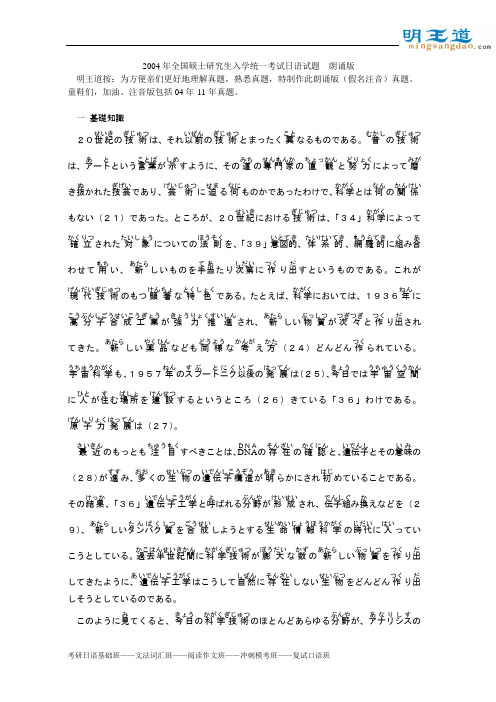
2004年全国硕士研究生入学统一考试日语试题 朗诵版明王道按:为方便亲们更好地理解真题,熟悉真题,特制作此朗诵版(假名注音)真题。
童鞋们,加油。
注音版包括04年-11年真题。
一 基礎知識20世紀せいきの技術ぎじゅつは、それ以前いぜんの技術ぎじゅつとまったく異ことなるものである。
昔むかしの技術ぎじゅつは、アあートとという言葉ことばが示しめすように、その道みちの専門家せんもんかの直観ちょっかんと努力どりょくによって磨みがき抜ぬかれた技芸ぎげいであり、芸術げいじゅつに迫せまる何なにものかであったわけで、科学かがくとは何なんの関係かんけいもない(21)であった。
ところが、 20世紀せいきにおける技術ぎじゅつは、「34」科学かがくによって確立かくりつされた対象たいしょうについての法則ほうそくを、「39」意図的いとてき、体系的たいけいてき、網羅的もうらてきに組くみ合あわせて用もちい、新あたらしいものを手当てあたり次第しだいに作つくり出だすというものである。
これが現代技術げんだいぎじゅつのもつ顕著けんちょな特色とくしょくである。
たとえば、科学かがくにおいては、1936年ねんに高分子合成工業こうぶんしごうせいこうぎょうが強力推進きょうりょくすいしんされ、新あたらしい物質ぶっしつが次々つぎつぎと作つくり出だされてきた。
新あたらしい薬品やくひんなども同様どうような考かんがえ方かた(24)どんどん作つくられている。
宇宙科学うちゅうかがくも、1957年ねんのスプすぷートニクとにく以後いごの発展はってんは(25)、今日きょうでは宇宙空間うちゅうくうかんに人ひとが住すむ場所ばしょを建設けんせつするというところ(26)きている「36」わけである。
原子力発展げんしりょくはってんは(27)。
最近さいきんのもっとも注目ちゅうもくすべきことは、DNA DNAの存在そんざいの確認かくにんと、遺伝子いでんしとその意味いみの(28)が進すすみ、多おおくの生物せいぶつの遺伝子構造いでんしこうぞうが明あきらかにされ初はじめていることである。
2004专四真题及答案详解TEM4word文本
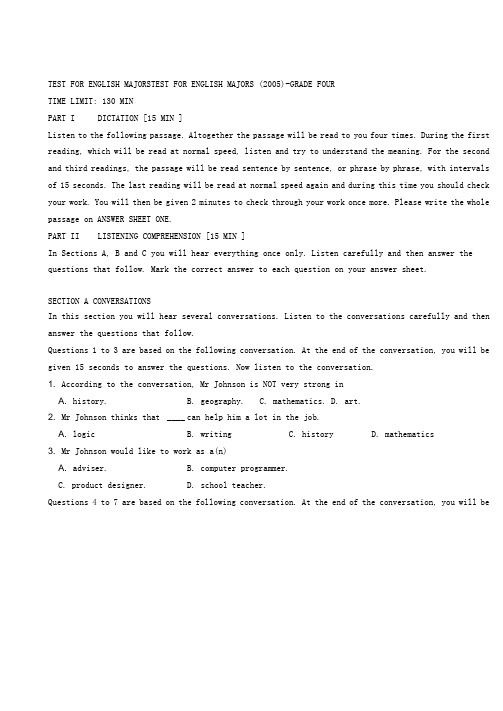
TEST FOR ENGLISH MAJORSTEST FOR ENGLISH MAJORS (2005)-GRADE FOURTIME LIMIT: 130 MINPART I DICTATION [15 MIN ]Listen to the following passage. Altogether the passage will be read to you four times. During the first reading, which will be read at normal speed, listen and try to understand the meaning. For the second and third readings, the passage will be read sentence by sentence, or phrase by phrase, with intervals of 15 seconds. The last reading will be read at normal speed again and during this time you should check your work. You will then be given 2 minutes to check through your work once more. Please write the whole passage on ANSWER SHEET ONE.PART II LISTENING COMPREHENSION [15 MIN ]In Sections A, B and C you will hear everything once only. Listen carefully and then answer the questions that follow. Mark the correct answer to each question on your answer sheet.SECTION A CONVERSATIONSIn this section you will hear several conversations. Listen to the conversations carefully and then answer the questions that follow.Questions 1 to 3 are based on the following conversation. At the end of the conversation, you will be given 15 seconds to answer the questions. Now listen to the conversation.1. According to the conversation, Mr Johnson is NOT very strong inA. history.B. geography.C. mathematics.D. art.2. Mr Johnson thinks that ____ can help him a lot in the job.A. logicB. writingC. historyD. mathematics3. Mr Johnson would like to work as a(n)A. adviser.B. computer programmer.C. product designer.D. school teacher.Questions 4 to 7 are based on the following conversation. At the end of the conversation, you will be4. What is the main purpose of the research?A. To make preparations for a new publication.C. To know how housework is shared.5. What does the man do on Fridays?A. He goes to exercise classes.C. He goes to the cinema.6. On which day does the couple always go out?A. Friday.B. Saturday.7. Which personal detail does the man give?A. Surname.B. First name.B. To learn how couples spend their weekends.D. To investigate what people do at the weekend.B. He goes sailing.D. He stays at home.C. Sunday.D. Any weekday.C. Address.D. Age.B. The train to Zhengzhou.D. The train to Hangzhou.given 20 seconds to answer the questions. Now listen to the conversation. Questions 8 to 10 are based on the following conversation. At the end of the conversation, you will be given 15 seconds to answerthe questions. Now listen to the conversation.8. Parcel Express needs the following details about the sender EXCEPTA. name.B. address.C. receipt.D. phone number.9. Parcels must be left open mainly forA. customs 'check.B. security check.C. convenience 's saDk.et.he company 's sake.10. The woman 's last inquiry is mayincloncerned withA. the time needed for sending the parcel.B. the flight time to New York.C. the parcel destination.D. parcel collection. SECTION B PASSAGESIn this section, you will hear several passages. Listen to the passages carefully and then answer the questions that follow.Questions 11 to 13 are based on the following passage. At the end of the passage, you will be given 15 seconds to answer the questions. Now listen to the passage.11. Where is the train to Nanjing now standing?A. At Platform 7.B. At Platform 8.C. At Platform 9.D. At Platform 13.12. Which train will now leave at 11:35?A. The train to Jinnan.C. The train to Tianjin.13. Which train has now been cancelled?A. The train to Jinnan.B. The train to Zhengzhou.C. The train to Tianjin.D. The train to Hangzhou.Questions 14 to 17 are based on the following passage. At the end of the passage, you will be given 20 seconds to answer the questions. Now listen to the passage.14. The museum was built in memory of those A. who died in wars.C. who lost their families in disasters.15. Henry Durant put forward the idea because he A. had once fought in a war in Italy.C. had assisted in treating the wounded.B. who worked to help victims. D. who fought in wars.B. had been wounded in a war.D. had seen the casualties and cruelties of war.A. It is just a lot of cheering.B. It mainly involves yelling.16. Which of the following statements about the symbols is INCORRECT? A. Both are used as the organizati on 's official symbols. B. Both are used regardless of religious significance. C. The red cross was the organization's original symbol.D. The red crescent was later adopted for use in certain regions. 17. How should cheerleading be viewed according to the passage?C. It mainly involves dancing.D. It is competitive in nature.Questions 18 to 20 are based on the following passage. At the end of the passage, you will be given 15 seconds to answer the questions. Now listen to the passage. 18. How do the cheerleaders perform their jobs? A. They set fireworks for their team. B. They put on athletic shows. C. They run around the spectators.D. They yell for people to buy drinks.19. Why do the cheerleaders sometimes suffer physical injuries? A. Because they try dangerous acts to catch people's attention.B. Because they shout and yell so their voice becomes hoarse.C. Because they go to the pyramid and the hills to perform.D. Because they dance too much every day for practice. 20. Which of the following statements is NOT true?A. The first cheerleaders was a man named John Campbell.B. Cheerleaders 'contests are only held at the state level.C. Before 1930 there were no women cheerleaders.D. The first cheerleading occurred in 1898. SECTION C NEWS BROAOCASTQuestions 21 to 22 are based on the following news. At the end of the news item, you will be given 10 seconds to answer the questions. Now listen to the news.21. How many of the emigrants died after being thrown into the sea? A. 15 of them.B. 3 of them.C. 100 of them.D. Dozens of them.22. The illegal emigrants came fromA. Italy.B. Africa.C. the Mediterranean region.D. places unknown. Question 23 is based on the following news. At the end of the news item, you will be given 5 seconds to answer the question. Now listen to the news.23. What does the news item mainly report?A. China will send three people into space in a week.B. Three Chinese astronauts will spend a week in space.C. The Shenzhou VI will be launched next year.D. Shenzhou V circled the earth for two days.Questions 24 and 25 are based on the following news. At the end of the news item, you will be given 10 seconds to answer the questions. Now listen to the news.24. Which of the following had NOT been affected by the wildfires?A. Houses.B. Land.C. Skies.D. Cars.25. The fires were thought to have been startedA. purposefully.B. accidentally.C. on the Mexican border.D. in southern California.Questions 26 to 28 are based on the following news. At the end of the news item, you will be given 15 seconds to answer the question. Now listen to the news.26. _______ r anks second among leading tourism nations.A. FranceB. The United StatesC. SpainD. Italy27. It is predicted that by 2020 China will receive visitors.A. 77 millionB. 130 millionC. 36.8 millionD. 100 million28. According to a Xinhua report, last year saw a ______ per cent increase in the number of Chinese traveling abroad.A. 16.6B. 30C. 100D. 37Question 29 and 30 are based on the following news. At the end of the news item, you will be given 10 seconds to answer the question. Now listen to the news.29. What would happen to the Argentine officers?A. They would be arrested by Spanish authorities.B. They would be tried in an Argentine court.C. They would be sent to Spain for trial.D. They would be tortured or murdered.30. What accusation would the Argentine officers face?A. Violation of human rights.B. Involvement in illegal actions.C. Planning anti-government activities.D. Being part of the military rule.PART III CLOZE [15 MIN. ]Decide which of the choices given below would best complete the passage if inserted in the corresponding blanks. Mark the best choice for each blank on your answer sheet.A person 's home is as much a reflection of his personality as the clothes he wears, the food he eats and the friends with whom he spends his time. Depending on personality, most have in mind a(n) “ (31) __________ home ” . But in general, and especially for the student or new wage earners, there are practical (32) _____ o f cash and location on achieving that idea.Cash (33) _______ , in fact, often means that the only way of (34) _ when you leaveschool is to stay at home for a while until things (35) financially. There are obvious (36) of living at home—personal laundry is usually (37) done along with the family wash; meals are provided and there will be a well-established circle of friends to (38) . And there is (39) the responsibility for paying bills, rates, etc. On the other hand, (40) depends on how a family gets on. Do your parents like your friends? Youmay love your family —(41) ____ do you like them? Are you prepared to be (42) ______when your parents ask where you are going in the evening and what time you expect to be back? If you find that you cannot manage a(n) (43) ________ , and that you finally have the money to leave,how do you (44) ________ finding somewhere else to live? If you plan to stay in your home area, the possibilities are (45) ___ well-known to you already. Friends and the local paper are always (46) _________ . If you are going to work in a (47) ________ area, again there are the papers—and the accommodation agencies, (48) ______ t hese should be approached with (49)_________ . Agencies are allowed to charge a fee, usually the (50) of the first week if you take accommodation they have found for you.31. A. ideal B. perfect C. imaginary D. satisfactory32. A. deficiencies B. weaknesses C. insufficiencies D. limitations33. A. cut B. shortage C. lack D. drain34. A. getting over B. getting in C. getting back D. getting along35. A. improve B. enhance C. develop D. proceed36. A. concerns B. issues C. advantages D. problems37. A. still B. always C. habitually D. consequently38. A. call in B. call over C. call upon D. call out39. A. always B. rarely C. little D. sometimes40. A. little B. enough C. many D. much41. A. and B. but C. still D. or42. A. tolerant B. hostile C. indifferent D. good-tempered43. A. agreement B. consensus C. compromise D. deal44. A. go about B. go over C. go in for D. go through45. A. seldom B. less C. probably D. certainly46. A. dependent B. a good source of informationC. of great valueD. reliable47. A. familiar B. cold C. humid D. new48. A. though B. while C. since D. as49. A. enthusiasm B. hesitation C. caution D. concern50. A. same B. equivalent C. equal D. similarityPART IV GRAMMAR &VOCABULARY [15 MIN ]There are thirty sentences in this section. Beneath each sentence there are four words or phrases marked A, B, C and D. Choose one word or phrase that best completes the sentence. Mark your answers on your answer sheet51. If you explained the situation to your solicitor, he able to advise you much better thanI can.A. would beB. will have beenC. wasD. were52. ________ , Mr. Wells is scarcely in sympathy with the working class.A. Although he is a socialistB. Even if he is a socialist。
2004年专四语法题
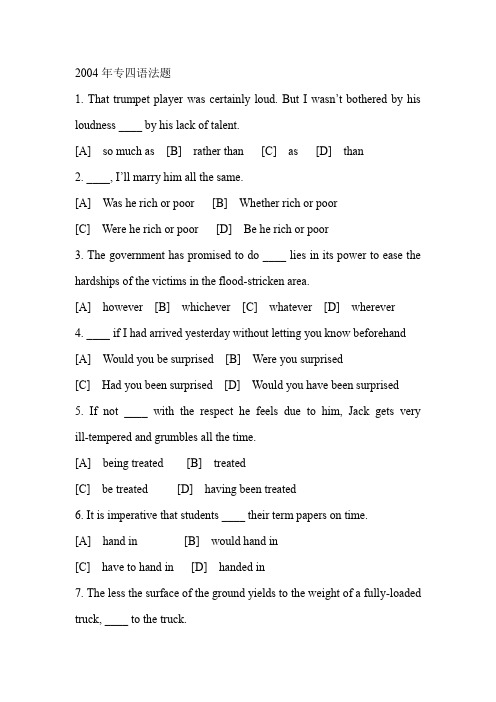
2004年专四语法题1. That trumpet player was certainly loud. But I wasn’t bothered by his loudness ____ by his lack of talent.[A] so much as [B] rather than [C] as [D] than2. ____, I’ll marry him all the same.[A] Was he rich or poor [B] Whether rich or poor[C] Were he rich or poor [D] Be he rich or poor3. The government has promised to do ____ lies in its power to ease the hardships of the victims in the flood-stricken area.[A] however [B] whichever [C] whatever [D] wherever4. ____ if I had arrived yesterday without letting you know beforehand[A] Would you be surprised [B] Were you surprised[C] Had you been surprised [D] Would you have been surprised5. If not ____ with the respect he feels due to him, Jack gets very ill-tempered and grumbles all the time.[A] being treated [B] treated[C] be treated [D] having been treated6. It is imperative that students ____ their term papers on time.[A] hand in [B] would hand in[C] have to hand in [D] handed in7. The less the surface of the ground yields to the weight of a fully-loaded truck, ____ to the truck.[A] the greater stress is [B] greater is the stress[C] the stress is greater [D] the greater the stress8. The Minister of Finance is believed ____ of imposing new taxes to raise extra revenue.[A] that he is thinking [B] to be thinking[C] that he is to think [D] to think9. Issues of price, place, promotion, and product are ____ conventional concerns in planning marketing strategies.[A] these of the most [B] most of those[C] among the most [D] among the many of10. ____ both sides accept the agreement, a lasting peace____ be established in this region.[A] Only if...will [B] If only...would[C] Should...will [D] Unless...would11. Mr. Wells, together with all the members of his family, ____ for Europe this afternoon.[A] are to leave [B] are leaving [C] is leaving [D] leave12. It was suggested that all government ministers should ____ information on their financial interests.[A] discover [B] uncover [C] tell [D] disclose13. As my exams are coming next week, I’ll take advantage of the weekend to ____ on some reading.[A] catch up [B] clear up [C] make up [D] pick up14. I’m surprised they are no longer on speaking terms. It’s not like either of them to bear a ____.[A] disgust [B] curse [C] grudge [D] hatred15. Mary hopes to be ____ from hospital next week.[A] dismissed [B] discharged [C] expelled [D] resigned16. Once a picture is proved to be a forgery, it becomes quite ____.[A] invaluable [B] priceless [C] unworthy [D] worthless17. Jimmy earns his living by ____ works of art in the museum.[A] recovering [B] restoring [C] renewing [D] reviving18. I couldn’t sleep last night because the tap in the bathroom was ____.[A] draining [B] dropping [C] spilling [D] dripping19. The book gives a brief ____ of the course of his research up till now.[A] outline [B] reference [C] frame [D] outlook20. She was standing outside in the snow, ____ with cold.[A] spinning [B] shivering [C] shaking [D] staggering21. All the rooms on the second floor have nicely ____ carpets, which are included in the price of the house.[A] adapted [B] equipped [C] suited [D] fitted22. He plays tennis to the ____ of all other sports.[A] eradication [B] exclusion[C] extension [D] inclusion23. She answered with an ____ “No” to the request that she attend the public hearing.[A] eloquent [B] effective [C] emotional [D] emphatic24. Everyone who has visited the city agrees that it is ____ with life.[A] vibrant [B] violent [C] energetic [D] full25. We met Mary and her husband at a party two months ago. ____ we’ve had no further communication.[A] Thereof [B] Thereby [C] Thereafter [D] Thereabouts参考答案:1-5: DC A B 6-10: A D B C A 11-15: C D A C B16-20: D B D A B 21-25: D B D AC1. That trumpet player was certainly loud. But I wasn’t bothered by his loudness ____ by his lack of talent.[A] so much as [B] rather than [C] as [D] than【参考答案】:A【题目解析】:固定用法。
日语专业四级考试样题
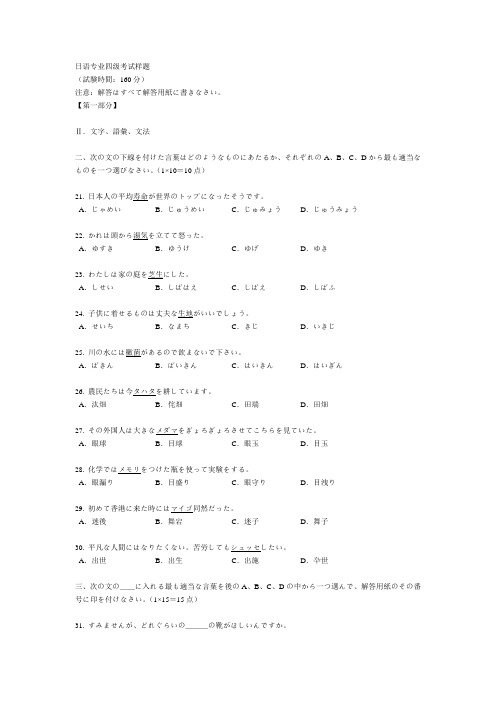
日语专业四级考试样题(試験時間:160分)注意:解答はすべて解答用紙に書きなさい。
【第一部分】Ⅱ.文字、語彙、文法二、次の文の下線を付けた言葉はどのようなものにあたるか、それぞれのA、B、C、Dから最も適当なものを一つ選びなさい。
(1×10=10点)21. 日本人の平均寿命が世界のトップになったそうです。
A.じゃめいB.じゅうめいC.じゅみょうD.じゅうみょう22. かれは頭から湯気を立てて怒った。
A.ゆすきB.ゆうけC.ゆげD.ゆき23. わたしは家の庭を芝生にした。
A.しせいB.しばはえC.しばえD.しばふ24. 子供に着せるものは丈夫な生地がいいでしょう。
A.せいちB.なまちC.きじD.いきじ25. 川の水には黴菌があるので飲まないで下さい。
A.ばきんB.ばいきんC.はいきんD.はいぎん26. 農民たちは今タハタを耕しています。
A.汰畑B.侘畑C.田端D.田畑27. その外国人は大きなメダマをぎょろぎょろさせてこちらを見ていた。
A.眼球B.目球C.眼玉D.目玉28. 化学ではメモリをつけた瓶を使って実験をする。
A.眼漏りB.目盛りC.眼守りD.目洩り29. 初めて香港に来た時にはマイゴ同然だった。
A.迷後B.舞宕C.迷子D.舞子30. 平凡な人間にはなりたくない。
苦労してもシュッセしたい。
A.出世B.出生C.出施D.卆世三、次の文の__に入れる最も適当な言葉を後のA、B、C、Dの中から一つ選んで、解答用紙のその番号に印を付けなさい。
(1×15=15点)31. すみませんが、どれぐらいの___の靴がほしいんですか。
A.サインB.サンダルC.サイズD.サ-ク32. はやい___でしゃべっているので、なかなか聞き取れません。
A.スピーチB.スタートC.スマートD.スピード33. お金も身分証明書もなくしてしまって、___目にあいました。
A.きついB.ひどいC.むずかしいD.くるしい34. そのビルの屋上に上ると、海が___。
自学考2004年4月_基础日语(一)
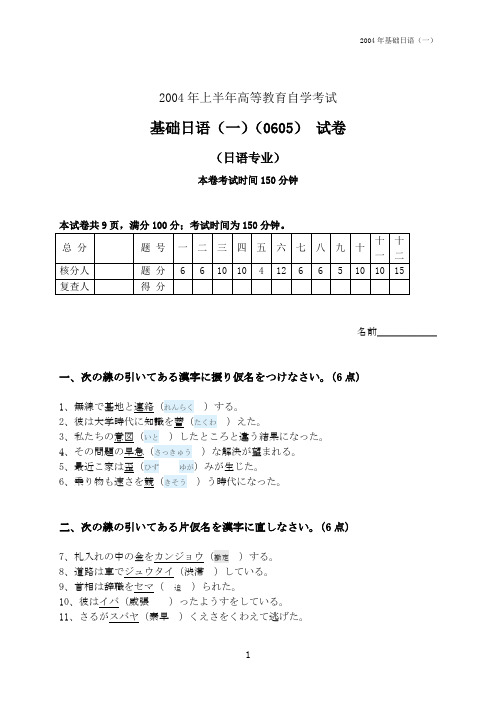
2004年上半年高等教育自学考试基础日语(一)(0605)试卷(日语专业)本卷考试时间150分钟本试卷共9页,满分100分;考试时间为150分钟。
名前______一、次の線の引いてある漢字に振り仮名をつけなさい。
(6点)12)えた。
3456二、次の線の引いてある片仮名を漢字に直しなさい。
(6点)7、札入れの中の金をカンジョウ(勘定)する。
8、道路は車でジュウタイ(渋滞)している。
9、首相は辞職をセマ(迫)られた。
10、彼はイバ(威張)ったようすをしている。
11、さるがスバヤ(素早)くえさをくわえて逃げた。
12、しばらく形勢をウカガ(窺)うことにしよう。
その一端から全体を窺う/借一斑而窥全豹三、後ろにある言葉から最も適当なものを一つ選んで、空欄の中に記号で書き入れなさい。
(10点)13、彼は来年の()は北京にいるでしょう。
A 今日ごろB 今ごろC このごろ近来;最近时期D 今日ころ14、買ったばかりの車を傷つけられて頭に()。
A きたB 切れたC 痛いD いった15、()あの人が負けるとは思いませんでした。
A まことB まさにC またはD まさか16、父は顔が()のでいろいろな人を知っています。
A 大きいB 広いC 厚いD 凄いすごい17、ぼくは()あいつは好きじゃない。
A なんにもB なんとしてもC なんだかD なんとか四、次の説明に最も合うものを一つ選んで、「○」をつけなさい。
(10点)18、このましくない状態に身をおく。
A ばらす弄得七零八散,拆开,拆卸,杀死B さらす晒す、曝す1暴晒2漂白3暴露4置身于C ちらすD くらす暮らす生活;度日;消磨岁月19、植物の繊維や針金などを太く長くより合わせたもの。
A スープ西洋料理的清汤B ジープ吉普车,越野车.C テープ绝缘胶带;卡带;录音带D ロープ绳;索;缆;钢缆20、あれこれと推測をすること。
A けんとう検討見当估计;推测B べんとう弁当简单饭菜,盒饭C でんとう伝統電灯D しんとう浸透21、内容に乏しくて取り上げる価値がない。
2004年日语专业四级考试试题 答案
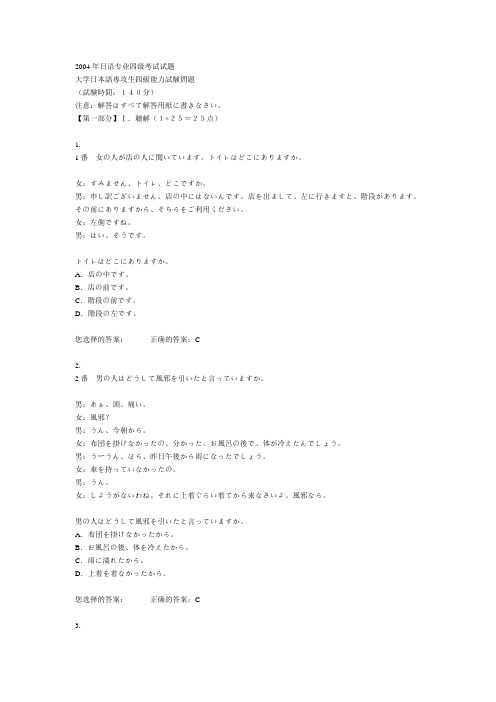
2004年日语专业四级考试试题大学日本語専攻生四級能力試験問題(試験時間:140分)注意:解答はすべて解答用紙に書きなさい。
【第一部分】Ⅰ.聴解(1×25=25点)1.1番女の人が店の人に聞いています。
トイレはどこにありますか。
女:すみません、トイレ、どこですか。
男:申し訳ございません。
店の中にはないんです。
店を出まして、左に行きますと、階段があります。
その前にありますから、そちらをご利用ください。
女:左側ですね。
男:はい、そうです。
トイレはどこにありますか。
A.店の中です。
B.店の前です。
C.階段の前です。
D.階段の左です。
您选择的答案:正确的答案:C2.2番男の人はどうして風邪を引いたと言っていますか。
男:あぁ、頭、痛い。
女:風邪?男:うん、今朝から。
女:布団を掛けなかったの。
分かった、お風呂の後で、体が冷えたんでしょう。
男:うーうん、ほら、昨日午後から雨になったでしょう。
女:傘を持っていなかったの。
男:うん。
女:しようがないわね。
それに上着ぐらい着てから来なさいよ。
風邪なら。
男の人はどうして風邪を引いたと言っていますか。
A.布団を掛けなかったから。
B.お風呂の後、体を冷えたから。
C.雨に濡れたから。
D.上着を着なかったから。
您选择的答案:正确的答案:C3.3番良子さんの部屋はどうですか。
男:良子さんの部屋は広いですか。
女:いいえ、広くありません。
狭いです。
男:新しい部屋ですか。
女:はい、新しいです。
だから、きれいです。
良子さんの部屋はどうですか。
A.広くてきれいです。
B.狭いがきれいです。
C.新しくて広いです。
D.狭くて汚いです。
您选择的答案:正确的答案:B4.4番男の人と女の人が話しています。
女の人が手に持っているのはどんな手紙ですか。
女:すみません、この手紙に押してある、これ、どういう意味ですか。
男:あて先不明。
女:あて先不明?男:ええ、ここに書いてある住所にはこの人はいないという意味ですよ。
日语专业四级考试样题 答案
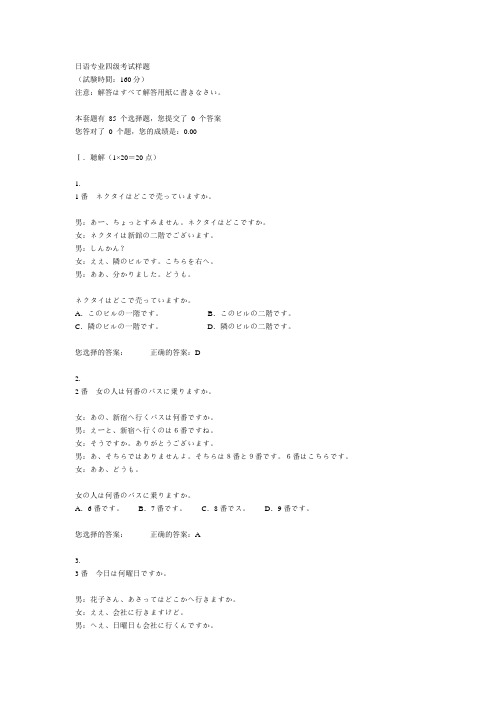
日语专业四级考试样题(試験時間:160分)注意:解答はすべて解答用紙に書きなさい。
本套题有85 个选择题,您提交了0 个答案您答对了0 个题,您的成绩是:0.00Ⅰ.聴解(1×20=20点)1.1番ネクタイはどこで売っていますか。
男:あー、ちょっとすみません。
ネクタイはどこですか。
女:ネクタイは新館の二階でございます。
男:しんかん?女:ええ、隣のビルです。
こちらを右へ。
男:ああ、分かりました。
どうも。
ネクタイはどこで売っていますか。
A.このビルの一階です。
B.このビルの二階です。
C.隣のビルの一階です。
D.隣のビルの二階です。
您选择的答案:正确的答案:D2.2番女の人は何番のバスに乗りますか。
女:あの、新宿へ行くバスは何番ですか。
男:えーと、新宿へ行くのは6番ですね。
女:そうですか。
ありがとうございます。
男:あ、そちらではありませんよ。
そちらは8番と9番です。
6番はこちらです。
女:ああ、どうも。
女の人は何番のバスに乗りますか。
A.6番です。
B.7番です。
C.8番でス。
D.9番です。
您选择的答案:正确的答案:A3.3番今日は何曜日ですか。
男:花子さん、あさってはどこかへ行きますか。
女:ええ、会社に行きますけど。
男:へえ、日曜日も会社に行くんですか。
女:いいえ、あさっては土曜日ですよ。
男:あれ、今日は金曜日でしょう。
女:いいえ、違いますよ。
男:あ、そうか。
今日は何曜日ですか。
A.木曜日です。
B.金曜日です。
C.土曜日です。
D.日曜日です。
您选择的答案:正确的答案:A4.4番男の人は昨日何をしましたか。
女:小林さん、昨日何をしましたか。
男:本を読んでいました。
女:じゃあ、うちにいたんですか。
男:いいえ。
女:あ、じゃあ、図書館?男:いいえ、天気がよかったから公園で。
女:ああ、いいですね。
男の人は昨日何をしましたか。
A.うちにいました。
B.公園で遊びました。
C.図書館に行きました。
D.外で本を読みました。
日语2004年四级真题
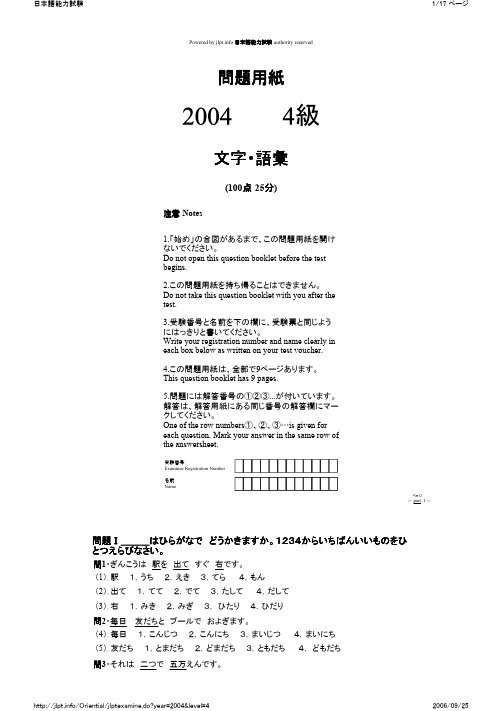
Powered by 日本語能力試日本語能力試験験 authority reserved問題用紙級文字文字・・語彙(100点 25分)注意 Notes1.「始め」の合図があるまで、この問題用紙を開けないでください。
Do not open this question booklet before the test begins.2.この問題用紙を持ち帰ることはできません。
Do not take this question booklet with you after the test.3.受験番号と名前を下の欄に、受験票と同じようにはっきりと書いてください。
Write your registration number and name clearly in each box below as written on your test voucher.4.この問題用紙は、全部で9ページあります。
This question booklet has 9 pages.5.問題には解答番号の①②③...が付いています。
解答は、解答用紙にある同じ番号の解答欄にマークしてください。
One of the row numbers ①、②、③…is given for each question. Mark your answer in the same row of the answersheet.受験番号Examinee Registration Number名前 Name-- part ページ1 --問題問題ⅠⅠ______はひらがなではひらがなではひらがなで どうかきますかどうかきますか。
12341234からいちばんいいものをひからいちばんいいものをひとつえらびなさいとつえらびなさい。
問1・ぎんこうは 駅を 出て すぐ 右です。
(1).駅 1.うち 2.えき 3.てら 4.もん(2).出て 1.てて 2.でて 3.たして 4.だして (3).右 1.みき 2.みぎ 3. ひたり 4.ひだり 問2・毎日 友だちと プールで およぎます。
大学日语学习必备——2004年考研日语真题假名注音版

2004年全国硕士研究生入学统一考试日语试题 朗诵版明王道按:为方便亲们更好地理解真题,熟悉真题,特制作此朗诵版(假名注音)真题。
童鞋们,加油。
注音版包括04年-11年真题。
一 基礎知識20世紀せいきの技術ぎじゅつは、それ以前いぜんの技術ぎじゅつとまったく異ことなるものである。
昔むかしの技術ぎじゅつは、アあートとという言葉ことばが示しめすように、その道みちの専門家せんもんかの直観ちょっかんと努力どりょくによって磨みがき抜ぬかれた技芸ぎげいであり、芸術げいじゅつに迫せまる何なにものかであったわけで、科学かがくとは何なんの関係かんけいもない(21)であった。
ところが、 20世紀せいきにおける技術ぎじゅつは、「34」科学かがくによって確立かくりつされた対象たいしょうについての法則ほうそくを、「39」意図的いとてき、体系的たいけいてき、網羅的もうらてきに組くみ合あわせて用もちい、新あたらしいものを手当てあたり次第しだいに作つくり出だすというものである。
これが現代技術げんだいぎじゅつのもつ顕著けんちょな特色とくしょくである。
たとえば、科学かがくにおいては、1936年ねんに高分子合成工業こうぶんしごうせいこうぎょうが強力推進きょうりょくすいしんされ、新あたらしい物質ぶっしつが次々つぎつぎと作つくり出だされてきた。
新あたらしい薬品やくひんなども同様どうような考かんがえ方かた(24)どんどん作つくられている。
宇宙科学うちゅうかがくも、1957年ねんのスプすぷートニクとにく以後いごの発展はってんは(25)、今日きょうでは宇宙空間うちゅうくうかんに人ひとが住すむ場所ばしょを建設けんせつするというところ(26)きている「36」わけである。
原子力発展げんしりょくはってんは(27)。
最近さいきんのもっとも注目ちゅうもくすべきことは、DNA DNAの存在そんざいの確認かくにんと、遺伝子いでんしとその意味いみの(28)が進すすみ、多おおくの生物せいぶつの遺伝子構造いでんしこうぞうが明あきらかにされ初はじめていることである。
2004和2003年日语4级听力材料(全)
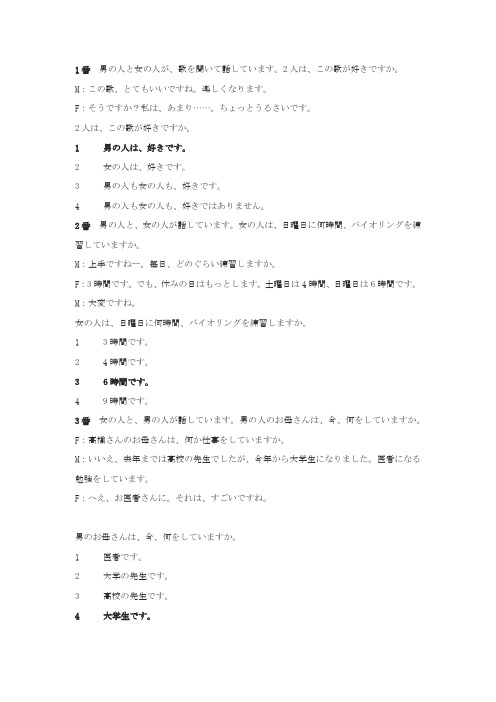
1番男の人と女の人が、歌を聞いて話しています。
2人は、この歌が好きですか。
M:この歌、とてもいいですね。
楽しくなります。
F:そうですか?私は、あまり……。
ちょっとうるさいです。
2人は、この歌が好きですか。
1男の人は、好きです。
2女の人は、好きです。
3男の人も女の人も、好きです。
4男の人も女の人も、好きではありません。
2番男の人と、女の人が話しています。
女の人は、日曜日に何時間、バイオリングを練習していますか。
M:上手ですねー。
毎日、どのぐらい練習しますか。
F:3時間です。
でも、休みの日はもっとします。
土曜日は4時間、日曜日は6時間です。
M:大変ですね。
女の人は、日曜日に何時間、バイオリングを練習しますか。
1 3時間です。
2 4時間です。
3 6時間です。
4 9時間です。
3番女の人と、男の人が話しています。
男の人のお母さんは、今、何をしていますか。
F:高橋さんのお母さんは、何か仕事をしていますか。
M:いいえ、去年までは高校の先生でしたが、今年から大学生になりました。
医者になる勉強をしています。
F:へえ、お医者さんに。
それは、すごいですね。
男のお母さんは、今、何をしていますか。
1医者です。
2大学の先生です。
3高校の先生です。
4大学生です。
4番男の人と、女の人が話しています。
男の人は、京都で、何をしましたか。
M:これ、京都で買ったお菓子です。
どうぞ。
F:ありがとうございます。
旅行ですか?M:はい、友だちの結婚パーティーでした。
おととい行って、夕べ帰ったんです。
有名なところへも行きたかったんですけど、時間がありませんでした。
男の人は、京都で、何をしましたか。
1仕事をしました。
2結婚パーティーに行きました。
3結婚しました。
4有名なところへ行きました。
5番男の人が話しています。
この人は、先週、何日休みましたか。
M:先週は、本当に忙しかったです。
私の会社は、土曜日と日曜日が休みです。
でも、先週の土曜日は、休まないで会社に行きました。
日语四级
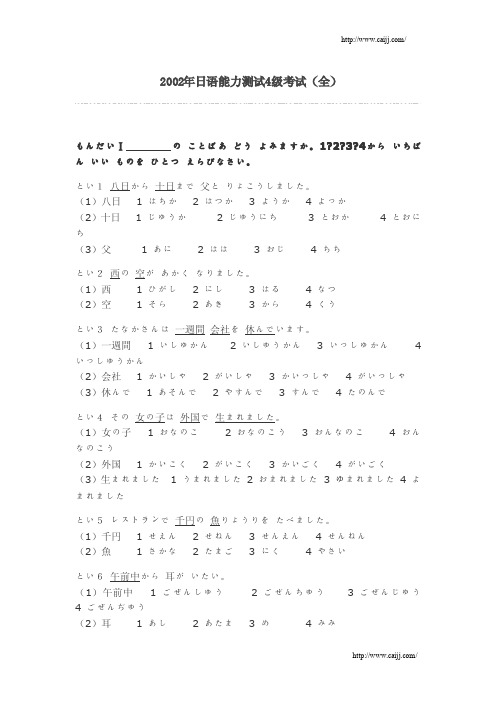
2002年日语能力测试4级考试(全)もんだいⅠのことばあどうよみますか。
1?2?3?4からいちばんいいものをひとつえらびなさい。
とい1八日から十日まで父とりょこうしました。
(1)八日1はちか2はつか3ようか4よっか(2)十日1じゅうか2じゅうにち3とおか4とおにち(3)父1あに2はは3おじ4ちちとい2西の空があかくなりました。
(1)西1ひがし2にし3はる4なつ(2)空1そら2あき3から4くうとい3たなかさんは一週間会社を休んでいます。
(1)一週間1いしゅかん2いしゅうかん3いっしゅかん4いっしゅうかん(2)会社1かいしゃ2がいしゃ3かいっしゃ4がいっしゃ(3)休んで1あそんで2やすんで3すんで4たのんでとい4その女の子は外国で生まれました。
(1)女の子1おなのこ2おなのこう3おんなのこ4おんなのこう(2)外国1かいこく2がいこく3かいごく4がいごく(3)生まれました1うまれました2おまれました3ゆまれました4よまれましたとい5レストランで千円の魚りょうりをたべました。
(1)千円1せえん2せねん3せんえん4せんねん(2)魚1さかな2たまご3にく4やさいとい6午前中から耳がいたい。
(1)午前中1ごぜんしゅう2ごぜんちゅう3ごぜんじゅう4ごぜんぢゅう(2)耳1あし2あたま3め4みみもんだいⅡのことばはどうかきますか。
1?2?3?4からいちばんいいものをひとつえらびなさい。
とい1たかいやまのうえからがっこうがみえます。
(1)たかい1古い2高い3長い4重い(2)やま1川2土3山4田(3)うえ1上2下3止4午(4)がっこう1**2**3**4学校とい2ばすとたくしーのどっちがはやいですか。
(1)ばす1ベス2バス3ベマ4バマ(2)たくしー1タクシー2タクツー3タワシー4タワツーとい3そのみせのかどをひだりにまがってください。
(1)みせ1庄2床3店4*(2)ひだり1石2右3*4左とい4まちのみなみがわはみどりがおおい。
2004年日语专业四级考试试题

2004年日语专业四级考试真题Ⅰ.聴解(1×25=25点)Ⅱ.文字、語彙、文法一、次の文の下線をつけた漢字の正しい読み方を、後のA、B、C、Dの中から一つ選びなさい。
(1×10=10点)26.きめの細かい、なめらかなクリームの方が皮膚に良い。
A.ほそ B.ほさ C.こめ D.こま27.僕はよく休日を利用して旅行にいく。
A.やすみひ B.やすみび C.きゅうにち D.きゅうじつ28.彼はさすが有名な歌手だけあって、いい喉をしている。
A.のと B.のど C.のうと D.のうど29.それは客観的現実にあわない、無邪気な考え方にすぎない。
A.ぶじゃけ B.ぶじゃき C.むじゃけ D.ぶじゃき30.封建的人間関係は、社会の近代化を著しく妨げるものである。
A.はばみ B.こばみ C.さまた D.さまち31.このような珍しい本を入手することはなかなか容易なことではないんだよ。
A.よい B.ようい C.よえき D.ようえき32.きみに恥をかかせるようなことは決してしない。
A.はじ B.はず C.はち D.さらし33.頂上へ近づくにしたがってしだいに眺めがよくなる。
A.なぞ B.のぞ C.なが D.のが34.本屋の店内には天井まで本がぎっしり積み上げられている。
A.てんじょう B.てんせい C.てんい D.てんじん35.技術はね、そう簡単に習えるものではないんだよ。
A.まな B.しゅう C.なら D.しゅ二、次の文__に入れるのに最も適当な言葉を後のA、B、C、Dから一つ選びなさい。
(1×20=20点)36.人間は誰でも、見てはいけない言われると__見たくなるものだ。
A.あまり B.かなり C.なかなか D.よけい37.持っていたお金を__使ってしまって、おみやげも買えなくなった。
A.じゅうぶん B.すっかり C.ずっと D.ちょっと38.病気だと聞いてお見舞いに行ったが、__元気だった。
- 1、下载文档前请自行甄别文档内容的完整性,平台不提供额外的编辑、内容补充、找答案等附加服务。
- 2、"仅部分预览"的文档,不可在线预览部分如存在完整性等问题,可反馈申请退款(可完整预览的文档不适用该条件!)。
- 3、如文档侵犯您的权益,请联系客服反馈,我们会尽快为您处理(人工客服工作时间:9:00-18:30)。
2004年日语专业四级考试真题(試験時間:140分)注意:解答はすべて解答用紙に書きなさい。
【第一部分】I.聴解(1✕25=25点)II.文字、語彙、文法一、次の文の下線をつけた漢字の正しい読み方を、後のA、B、C、Dの中から一つ選びなさい。
(1✕10=10点)26、きめの細かい、なめらかなクリームの方が皮膚に良い。
A.ほそB.ほさC.こめD.こま27、僕はよく休日を利用して旅行に行く。
A.やすみひB.やすみびC.きゅうにちD.きゅうじつ28、彼はさすが有名な歌手だけあって、いい喉をしている。
A.のとB.のどC.のうとD.のうど29、それは客観的現実にあわない、無邪気な考え方にすぎない。
A.ぶじゃけB.ぶじゃきC.むじゃけD.むじゃき30、封建的人間関係は、社会の近代化を著しく妨げるものである。
A.はばみB.こばみC.さまたD.さまち31、このような珍しい本を入手することはなかなか容易なことではないんだよ。
A.よいB.よういC.よえきD.ようえき32、きみに恥をかかせるようなことは決してしない。
A.はじB.はずC.はちD.さらし33、頂上へ近づくにしたがってしだいに眺めがよくなる。
A.なぞB.のぞC.ながD.のが34、本屋の店内には天井まで本がぎっしり積み上げられている。
A.てんじょうB.てんせいC.てんいD.てんじん35、技術はね、そう簡単に習えるものではないんだよ。
A.まなB.しゅうC.ならD.しゅ二、次の文に入れるのに最も適当な言葉を後のA、B、C、Dの中から一つ選びなさい。
(1✕20=20点)36、人間は誰でも、見てはいけない言われると見たくなるものだ。
A.あまりB.かなりC.なかなかD.よけい37、持っていたお金を使ってしまって、おみやげも買えなくなった。
A.じゅうぶんB.すっかりC.ずっとD.ちょっと38、病気だと聞いてお見舞いに行ったが、元気だった。
A.大いにB.ほとんどC.あいにくD.けっこう39、「十時以降なら家にいるので、電話してください。
」A.だいぶB.実にC.たいていD.一向に40、これは何だかおかしい。
A.ことB.わいC.だいD.ぞ41、会社を首になり、不況で次の仕事も見つからず、親からの借金は増える。
A.一方だB.一杯だC.片方だD.両方だ42、試験勉強をしなければならないが、つい眠気を。
A.悟るB.思うC.催すD.気づく43、あの時のことが脳裏に付いて離れない。
A.焼きB.打ちC.砕きD.押し44、ガンは発見が早ければ早い、治る確率が高いそうだ。
A.よりB.ほどC.かぎりD.ことに45、植物の根はいくつかの重要な機能を持っている。
土の中から必要な水分と養分を取り入れること、葉で光合成された養分を蓄えることなどである。
A.しかしB.例えばC.結局D.要するに46、(他社の部長に)山田社長によろしくませんか。
A.おっしゃってくれB.伝えてくれC.話してくれD.お伝えてください47、(部下が課長に)「部長はこの点についてもう少し工夫が必要であるとました。
」A.言いB.申しC.おっしゃいD.述べ48、かわいくてかわいくて目に入れても痛くないだ。
A.よりB.ことにC.かぎりD.くらい49、九月から、私鉄、地下鉄の運賃が値上げさる。
A.といえなくもないB.といえるだろうC.ということだD.というものだ50、欲しくてカメラがあるが、高くて、手に入れることは難しい。
A.たまらないB.我慢できないC.いけないD.たえられない51、百万円も?こんな大金、親が貸してくれる。
A.わけではないB.わけはないC.つもりはないD.たとえはない52、弁論大会で入賞したことをみんなにしようがない。
A.話したくてB.話したいのでC.話したところでD.話したがって53、彼のほうが悪いんだから、きみが謝る。
A.ことだB.ことはないC.ことにしたD.こともある54、用事があって電話留守だった。
A.するところB.しているとことC.したところD.したいところ55、先生が言った勉強すれば、絶対能力試験に合格できるよ。
A.途端にB.通りにC.ところにD.途中に三、次の文に入れるのに最も適当な助詞を後のA、B、C、Dから一つ選びなさい。
(1✕10=10点)56.花は咲く鳥はさえずる、楽しい春になった。
A.けれど…けれども…B.から…から…C.し…し…D.たり…たり…57.田中さんのけがは治る十日ぐらいかかるだろう。
A.のとB.のにC.のでD.のを58.英語も数学も学校を出てからは、忘れていくだ。
A.ばかりB.しかC.ほどD.くらい59.「デパートで何か買いましたか。
」「ええ、シャツ靴下、いろいろ買いました。
」A.と…とB.が…がC.など…などD.とか…とか60.牛乳バターやチーズを作る。
A.にもB.ともC.からD.ので61.(女性)それ、私のコートだ。
A.いB.のC.わD.ぜ62.今日は雤が降る、雲一つないいい天気だった。
A.どころかB.もののC.ところでD.ことか63.薬物で治療する手術するほうがいい。
A.からB.よりC.のでD.まで64.試験が近づいた、とても遊んでいられない。
A.ところでB.のにC.もののD.から65.冗談そんなことを言ってはいけない。
A.とはB.にもC.でもD.では四、次の文に入れるのに最も適当な表現を後のA、B、C、Dから一つ選びなさい。
(1✕10=10点)66.彼は二十歳にもなったくせに、まだ親に部屋の掃除をして。
A.くれているB.もらっているC.あげているD.くださっている67.知り合いだからといって、無料で。
A.入場させてはいけないB.入場させてもかまわないC.入場させるほかはないD.入場させたらいい68.おじは若いころ仕事を、夜学校へ通っていた。
A.しながらB.したのでC.してもD.したのに69.お母さんは忙しいので、子供を買い物にた。
A.行っB.行かせられC.行かれD.行かせ70.私は一度日本へ行ってと思う。
A.みたがるB.みるC.みたいD.みよ71.昨日頭が痛くて来たくないと言っていたら、今日は来る。
A.ものではないB.はずはないC.わけにはいかないD.のではない72.「電話をかけたいので、百円玉を。
」A.お借りできませんかB.お借りしませんかC.お借りくれませんかD.お借りになりませんか73.わたしは昨日の英語の試験の結果が気に。
A.なっていけないB.なってはいけないC.なってならないD.なってはならない74.芋をが、どうしても食べられなかった。
A.食べたB.食べなっかたC.食べようとしたD.食べてならなかった75.図書館で借りられる本だから、本屋で買う。
A.わけもないB.はずではないC.ほうがないD.までもないIII.読解「読解A」五、次の(文章1)~(文章4)を読んで、それぞれの問いに対する最も適当な答えをA、B、C、Dから一つ選びなさい。
(文章1)青春時代、文学を語ったボーイフレンドから再会したいとの電話があった。
私は慌てた。
何しろ半世紀以上[①]。
女は老けやすい。
初恋の相手ではないが迷う。
思いきって会えば、同時代を生きてきたか話題は極めて豊富である。
再会することによって、嫌われたり嫌われたっていい。
②聞き直って[注1]最寄の駅で会うことにした。
おしゃれをすると薄着になり風邪を引くのでズボンは離さず、ジャンバーだけコートに変えた。
約束した時刻、駅の改札口で待つことしばし。
果たしてお互いの顔のみわけが付くだろうか。
向こうでもそんな気持ちでいるに違いない。
わからなかったらどうでしょう。
仕方がない、運を天に任せようと思って時計の針を見上げていると、電車がついてどっと乗客がおりてきた。
テレパシー[注2]といおうか、それらしい人がじっとこちらへ視線を注いで近づく。
③私はちょっと耳の所まで手を挙げた。
近付いてくる人の視線がたちまちこれに答えた。
答えた笑顔の中に半世紀の面影が浮かんだ。
[注1]聞き直る:(辞書的な意味)急に態度を変えて、厳しい様子を見せる。
[注2]テレパシー:(辞書的な意味)遠く離れている人同士の気持ちや考えていることが、一種の心霊現象で分かること。
76、[①]に入る一番適当な言葉はどれか。
A.お目にしていないB.お目にかかっていないC.お会いになっていないD.拝見していない77、②聞き直ってとはこの文章ではどんな意味なのか。
A.女は老けやすいものだと思ってB.会えば話すことはたくさんあると思ってC.初恋の相手ではないと思ってD.嫌われたら嫌われたっていいと思って78、③私はちょっと耳の所まで手を挙げたとあるが、なぜこの動作をしたのか。
A.たぶん昔のボーイフレンドじゃないだろうと思ったからB.昔のボーイフレンドだとすぐ分かって、自信があったからC.昔のボーイフレンドかもしれないと思ったが、自信がなかったからD.昔のボーイフレンドだとすく分かったが、手を高く挙げるのは恥ずかしいから(文章2)言葉の姿である文字には、意味と印象がまとついています。
しかし新聞を読む私たちは文字の意味を読み取るだけで、文字の印象を「①」ことはまれです。
ところが[地震]という本文用の小さな文字も、拡大されて見出しになると[地震!]、感嘆符つきの印象を意味と一緒に読まされている、と気付くはずです。
79、[①]に入る一番適当な言葉はどれか。
A.気になるB.気に入るC.気にするD.気に掛かる80、作者が言いたいことは何か。
A.私たちは気が付かなくても文字の印象の影響を受けているB.拡大された文字は小さな文字より印象が強いC.私たちは文字の意味より印象に注意しているD.文字が拡大されると意味が変化する(文章3)ところで、保険とは何でしょうか。
人は事故や病気で、いつ死ぬかもしれません。
(中略)こういう不幸は、偶然で、起こるかもしれないし、起こらずにすむかもしれません。
ただ、不幸に遭う人は非常に少ないことは確かです。
[不幸に遭うかもしれない]と思う人がたくさん集まって、①その時にそなえて、少しずつお金を出し合えば、大きな額になります。
[ちりも積もれば山となる]です。
その大部分の人は不幸に遭わずにすみますから、不幸にあったわずかな人は、他の人たちが払ってきた、まとまったお金をもらえる、というのが②保険の基本的な考え方です。
81、①その時とはたとえばどんな時なのか。
A.保険に入った時B.人がたくさん集まった時C.お金が大きな額になった時D.火事や病気になったりした時82、②保険の基本的な考え方に含まれるものはどれか。
A.事故で死んだり、家が火事になったりする人は少ないB.みんなで少しずつお金を出し合えば、不幸に遭わないC.自分が死んだ後のことを心配しても仕方がないC.自分が不幸に遭う心配をする人はあまりいない(文章4)日本人の生活習慣も、時代とともに変わっていく。
